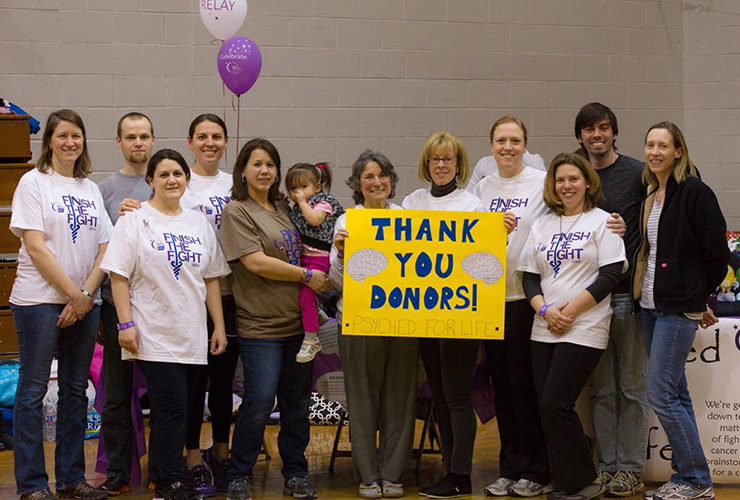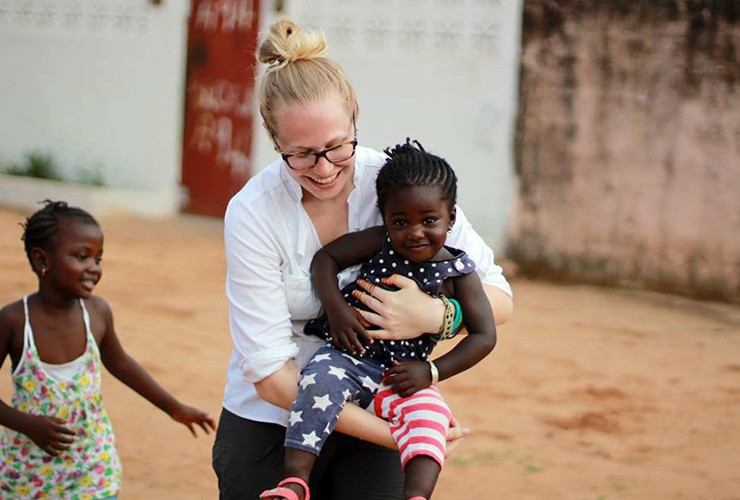On April 17, 2014, Dr. Carolyn Tucker (University of Florida) presented on “A Culturally Sensitive Health Self-Empowerment Approach to Reducing Obesity in Culturally Diverse Communities” as part of the Psychology Lecture Series: Health and the Obesity “Crisis”.
Archives for October 2014
5th Annual SMCM American Cancer Society Relay for Life

On March 1, 2014, the Psyched for Life Team, consisting of Angie Draheim (captain) and 3 of her family members, Prof. Aileen Bailey and 2 of her family members, Prof. Anne Marie Brady, Prof. Renee Dennison, Prof. Laraine Glidden, Dr. Cynthia Koenig, Prof. James Mantell and 1 of his family members, Prof. Scott Mirabile, and Prof. Jennifer Tickle participated in the 12-hour, 5th Annual SMCM American Cancer Society Relay for Life event. Virtual team members/fundraisers also included Prof. Debbie O’Donnell and Katie Henderson ’16. Overall, the team helped to raise general and brain cancer awareness as well as $5,248.50 for ACS research & patient support programs. The entire Relay event raised $30,768.43. The next Relay is scheduled for February 28, 2015. The Department of Psychology has had the largest academic department based team at the SMCM Relay since 2010.
Don’t Let Doing the Dishes Do You Part
If you are thinking about getting married, St. Mary’s College of Maryland Assistant Professor of Psychology Renée Peltz Dennison would like to offer this advice: be very clear beforehand about what your expectations are for marriage.
In Dennison’s recent study, “The Role of Couple Discrepancies in Cognitive and Behavioral Egalitarianism in Marital Quality,” she and colleagues Brian Ogolsky and James Monk of the University of Illinois at Urbana‑Champaign surveyed over 200 newlyweds to find out how husbands’ and wives’ perceptions of gender roles affect marital satisfaction.
They found that an uneven division of household chores negatively affected wives’ marital satisfaction, especially when wives felt the roles should be more equal. “We found that, for wives, if there is a discrepancy between expectations and what’s actually playing out in the marriage, wives end up being significantly less satisfied in the marriage,” said Dennison. “For husbands, on the other hand, sharing household tasks doesn’t seem to be directly related to their marital satisfaction. It is possible that they do not perceive a discrepancy or that they buy into the idea that women should do the ‘second shift.’”
Talking about expectations early on can help put couples’ marriage on the right track, but follow through, Dennison advises, is key. “Talk about whether you believe in traditional gender roles or more egalitarian gender roles, and then set up patterns that reflect your beliefs about marriage,” she said. “Often in the absence of actively working on making your day-to-day tasks match your egalitarian beliefs, things can slide back into more traditional gender roles.”
A majority of the newlyweds sampled were Maryland residents and recruited through county marriage records. Dennison said that undergraduate research assistants were critical in bringing the research to fruition. “The students travelled to six different county court houses in Maryland to obtain marriage records,” Dennison noted. “They helped in recruiting participants, designing the online survey taken by the couples, and analyzing the data once the couples’ responses came in.” Dennison also noted that students are now helping with drafting manuscripts to submit for publication.
Dennison and her students have just finished collecting a second wave of data from the same Maryland couples. The goal, Dennison said, is to follow the couples over time to see how the things they reported in the first year of marriage affect outcomes in their later years of marriage.
Listen to Dr. Dennison’s podcast on why chore sharing can make or break a marriage.
External Research Grants

Utsav Gyawali ’14 receives Sigma Xi Grant of $1,000 in support of his SMP research, “Reversal of Compulsive Cocaine Seeking in Neonatal Ventral Hippocampal Lesion Model of Schizophrenia” (under the mentorship of Dr. Anne Marie Brady).
More info:
Utsav will present his findings at the annual meeting of the Society for Neuroscience in Washington, D.C. in November 2014. The grant also helped to cover some findings he presented at the 2013 SFN meeting. Utsav was active in research in the Behavioral Neuroscience lab in both his junior and senior years.
Student Accomplishment: Camille Hogan’s Poster Award
Camille Hogan ’16 presented a poster at the APA conference in August 2014. “There is a Devil in my Neighborhood” The Study of Gambian Spiritual Beliefs and Treatments,” won a 2nd place student poster award from the Division of International Psychology. She conducted her directed research under the supervision of Prof. Debbie O’Donnell.
Faculty Accomplishment: Prof. Libby Nutt Williams publishes counseling textbook.
“The first edition of this seminal book appeared more than twenty years ago and was acknowledged as the first comprehensive overview of counseling psychology. This long-anticipated new edition has been thoroughly updated to serve a new generation of undergraduate and graduate students and all readers who want to know more about the field. It has been skillfully reorganized to clearly present the history of the field, its foundational principles and practices, its relationship to other psychological disciplines, and its four primary therapeutic approaches psychoanalytic, cognitive-behavioral, humanistic, and feminist multicultural.” (Amazon.com)
The text is available in the SMCM library. Gelso, C., Williams, E., and Fretz, B. (2014) Counseling Psychology, Third Edition. Washington, D.C.: American Psychological Association.
A leader in her field, Prof. Williams was named 2013 Woman of the Year for the Section for the Advancement of Women (SAW) of the Society of Counseling Psychology at the American Psychological Association.
Psychology in West Africa – Summer 2016
Earn 8 upper-level credits (4 in PSYC and 4 in ANTH). The 7-week field school (late May – early July) consists of language and culture training, directed research, cultural events, and overnight trips to upcountry villages.
One of the poorest countries in the world. Ninety five percent are Muslim. Peaceful and non-violent, Gambians model tolerance and acceptance. Spend your next summer living, learning,
and growing in The Gambia. Past students have described it as a life changing experience.
“Going to The Gambia taught me many things, but the most important thing I learned was what it means to be a person of service. From watching doctors in the emergency room to learning the importance of greetings to sharing a meal with Gambians, I learned that service to others doesn’t mean you have to change the world every day. It means giving what you can, whether that be time, rice, or a friendly greeting”. – Erin Harvey ’15
Learn more about the Field Study Program
2014-15 Psychology Lecture Series: Benefits and Risks of Technology Use on Children in the Home and at School
Each year, the psychology department identifies a different, current theme to be explored, and offers 3-4 lectures that are free and open to the public.
The 2014-15 Psychology Lectures Series will explore the effects of technology on child development with special emphasis on personal use of “smart” devices by children and the increased prevalence of using this technology in the classroom.
Series Rationale:
This year marks the 10th anniversary of the founding of Facebook, and the 25th anniversary of the creation of the World Wide Web. Today’s young people, sometimes called the “internet generation” are the first to grow up in this rapidly changing technological landscape. Moreover, the recent dramatic increase in access to handheld devices has made the use of this technology easier and more common than ever before (Common Sense Media, 2013). With these advances come many questions. What effects will this use of technology have on the physical, emotional, social, and cognitive development of young people today? Should we be encouraging children to use the latest technology (for example, incorporating it into our educational strategies), or should we be cautious about the use of technology? The American Academy of Pediatrics recommend that infants age 0-2 should not have any exposure to technology, children age 3-5 be limited to one hour per day, and children and adolescents age 6-18 be limited to 2 hours per day– but research shows that children and adolescents use 4-5 times the recommended amount (Kaiser Family Foundation, 2010). This speaker series focuses on the possible benefits, and possible risks, of this new technological age.
Common Sense Media, Program for the Study of Children and Media (2013). Zero to eight: Children’s media use in America in 2013. Retrieved from http://www.commonsensemedia.org/research/zero-to-eight-childrens-media-use-in-america-2013
Kaiser Family Foundation (2010). Generation M2: Media in the lives of 8- to 18-year-olds. Retrieved from http://kaiserfamilyfoundation.files.wordpress.com/2013/04/8010.pdf
Previous lecture series topics:
- 2013-14: Health and the Obesity “Crisis”
- 2012-13: Diagnosis, Treatment, and Prevention
- 2011-12: Populations in Need
Lectures
Friday, November 14
3:00pm in Goodpaster Hall 195
Dr. Mona Leigh Guha presents “Children Impacting Technology Rather than Technology Impacting Children”
Thursday, March 4
4:45pm in Goodpaster Hall 195
Dr. Larry Rosen presents “Child Health in the Digital Age: The Impact of New Technology in the Classroom and at Home”
Friday, April 3
3:00pm in Goodpaster Hall 195
Dr. Ui Jeong Moon presents “Changes in Media Use and Child Achievement”




